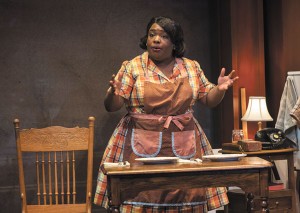The Civil Rights movement in the United States has several iconic figures: Martin Luther King, Jr.; Medgar Evers, Rosa Parks, W.E.B Du Bois, and Julian Bond to name just a few. Yet in list of leaders, Fannie Lou Hamer is rarely mentioned. Playwright Cheryl L. West’s work Fannie: the music and life of Fannie Lou Hamer goes a long way in fixing that oversight.
Born in Mississippi in 1917, Fannie was one of 20 children to parents who were sharecroppers. Her father was also a Baptist preacher, and Fannie began singing in church as a child — and she also had to join her parents in the fields at the tender age of six. Growing up surrounded by poverty, Fannie learned to read and write, married, and discovered at the age of 44 she had the right to vote. However, she also discovered that registering to vote as a Black person in Mississippi meant unfair literacy tests, intimidation, and other obstacles. Determined to vote and help her neighbors to register, Fannie became an activist in the early 1960s, and was arrested in 1963 for sitting in a white’s only cafe. There, she was brutally beaten, leaving her with life-long disabilities. Despite the setbacks and challenges, Fannie Lou Hamer kept organizing, kept pushing, and even ran for office. She died in 1977 and never stopped believing in the cause.
Fannie is part gospel revival, part drama, with songs interwoven into her story. The exceptional Maiesha McQueen blows the doors off the IRT Mainstage, backed with musicians Morgan E. Stevenson, Spencer Bean, and Dorian Phelps. The songs illustrate her strong desire and deep faith in the cause of freedom and justice, and a sing-along is encouraged at intervals. Even at her lowest, Fannie found strength in her spirituality and in the rightness of the cause.
Director Henry D. Godinez frames his star simply, letting her tell her own story with very few distractions. A few projections on the archways give the audience a historical perspective, but are never allowed to overshadow the personal story being told (and sung) on the stage.
The IRT’s production of Fannie runs through February 4. Tickets are available online at IRTLive.com or by calling 317-635-5252.



